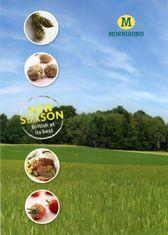
There have been mixed messages for organics and premium ranges this week.
The UK’s fourth largest supermarket group Morrisons announced another significant increase in its organic and Fairtrade ranges, while influential forecasting group, the Ernst & Young ITEM club, predicted that middle-class shoppers will abandon organic and fair trade food as inflation continues to climb.
Re:fresh Multiple Retailer of the Year Morrisons has set out organic and Fairtrade expansion as a key cog in its food strategy, and this year’s growth will come on the back of an exponential rise in sales in the last financial year.
The chain’s organic range will grow by 20 per cent this year (140 per cent to February 3), and its Fairtrade range is pegged to expand by 40 per cent (127 per cent last year).
The sales hikes are coming from a low base, but signal the commitment of Bradford-based Morrisons to widen its customer offer. A TV and in-store ad campaign launched this week focuses heavily on the promotion of fresh and seasonal lines, with the first fresh produce thrust into the spotlight being homegrown asparagus, Jersey Royals and strawberries.
But the strategy being driven by Morrisons chief executive Marc Bolland would be called into question, if the musings of Joel Segal, head of consumer products at Ernst & Young come to fruition. He forecast that consumers who were previously willing to pay up to 50 per cent more for organics or Fairtrade could ditch their ethical stance in favour of keeping their shopping bills down.
Segal said: "We are in a perfect economic storm and we are still seeing plenty of dark clouds ahead.
"Higher-end consumers will have to make a trade off. Either they stick to their principles, or - as they batten down the hatches - they may decide that they can live without fair trade or organic in order to avoid cutting back in other areas."
Although no retailer has yet pointed to a notable downturn in sales of premium ranges, Segal pointed to sales at discounters Aldi, Netto and Lidl, which have increased by 13 per cent on average over the past three months.
"Some will be faced with a tough choice of eating or heating their home," said Segal. "For some pensioners it will be very tough, but they will either have to rein in their consumption levels or they will have to reduce spending elsewhere."